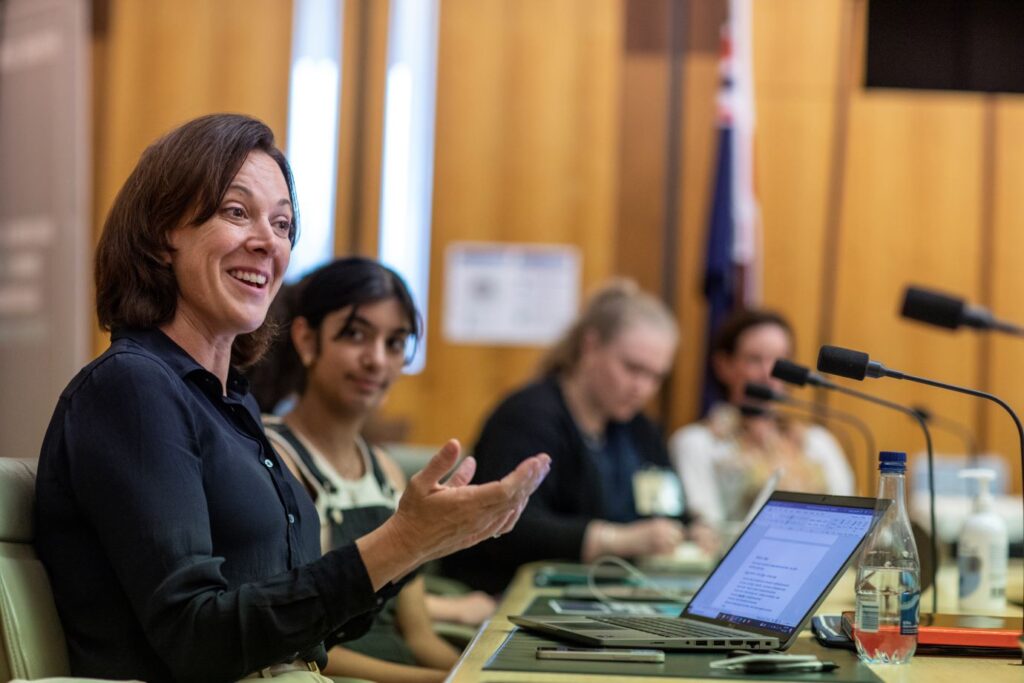A new bill to ensure the needs of young people are considered in government decision-making will be tabled in federal parliament on Monday.
The Wellbeing of Future Generations Bill 2025, set to be tabled by independent Dr Sophie Scamps, would impose a positive duty on the government and public bodies to take into account the long-term implications of their decisions.
It would also establish a Commissioner for Future Generations to lead a public consultation process on the issue.
The bill will be seconded by Liberal MP Bridget Archer and comes after growing demand for long-term decision-making in politics. Recent research from Griffith University’s EveryGen indicates that 81 per cent of Australians believe politicians focus excessively on short-term issues.
“Like all parents I want to provide my children with the best opportunity to live a safe, happy and prosperous life,” Dr Scamps said on Monday.
“But due to repeated policy failures over decades our young people now face converging crises. We are leaving our kids a far harder world to flourish in than the one we inherited.”
Dr Scamps noted that many of the current issues most pressing for young people, including housing, environmental issues, climate change, obesity, mental health, gambling harm and intergenerational inequality, have been “decades in the making”.
“None of these problems have happened overnight,” she said. “Decade after decade, leaders and decision-makers have not acted to make a difference. Instead, repeated short-term, Band-Aid actions have been futile, or even made the situation worse.”
The Wellbeing of Future Generations Bill 2025 is based on the experience of Wales, where similar legislation was introduced in 2015.
Dr Scamps says her bill would create a legislative framework to ensure intergenerational equity and wellbeing are considered and promoted in government.
“Over the past three years, I have witnessed firsthand the way that individual portfolios of the same government often work against each other. Portfolios, departments and public bodies should be working in concert with one another, rather than in competition,” she said.
“Australians want long-term solutions. They want politicians to think beyond their own re-election prospects every three years and put some serious effort into turning the ship around for future generations.”
The bill was developed in consultation with the Foundations for Tomorrow organisation and is supported by Professor Patrick McGorry, Director of Orygen Youth Health and the Intergenerational Fairness Coalition.
“Young people in Australia are facing growing mental health challenges. These are fuelled by intergenerational inequities such as housing insecurity, precarious employment, student debt, and a clouded future due to climate change and an alarming loss of a moral compass in the wider geopolitical world,” Professor Mcgorry said.
“Young people are being handed a raw deal and their needs have been seriously neglected by older generations, political leaders and the wider society. Yet it is precisely this emerging generation on whom the future of our society depends.
“The Wellbeing of Future Generations Bill is crucial to addressing these systemic issues by embedding long-term thinking into policy decisions.”
Managing Director of Foundations for Tomorrow, Taylor Dee Hawkins, said Australians are calling for governance that transcends electoral cycles to deliver a fair, sustainable future.
“Continued inaction erodes trust in government and engagement in democracy, highlighting the urgent need for meaningful reform,” Hawkins said.
Dr Scamps’ bill comes after campaigner Anjali Sharma and Senator David Pocock developed a bill in 2023 that would impose a “duty of care” on the government to ensure young people’s health and wellbeing is taken into consideration when decisions that could cause climate harm are made.


